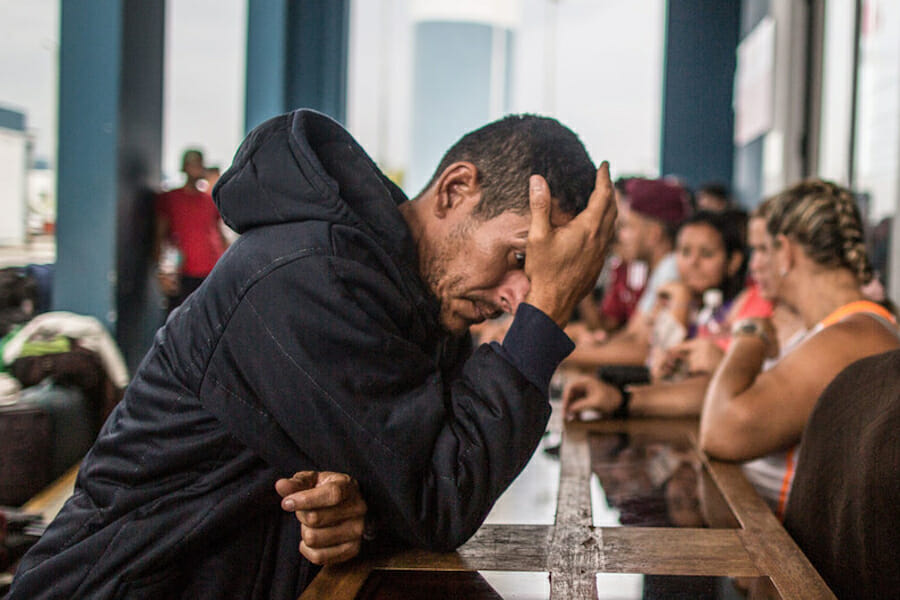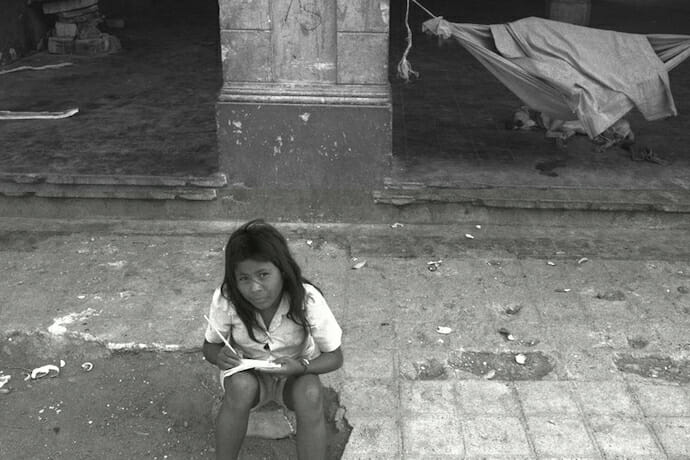
The Venezuelan Migration Crisis: The U.S. Must Play a Larger Role in a Regional Response
“Need a ride? Need a guide?” I was asked at least a dozen times. “Are you traveling alone? I have room in my truck. It’s very safe,” assured one man, as another advertised nearby, “Only $120 reais per person. How many bags do you have?” All this in the 30 feet between de-boarding the bus and grabbing my bag. Welcome to the border town of Pacaraima, Brazil. Home to some 12,000 Brazilians, and pathway to many of the 168,000 Venezuelans in Brazil fleeing their home. The border may have been closed, but the “trocheros” willing to sneak people and goods across clandestine trails were open for business.
Thousands of Venezuelans are crowded outside refugee camps and sleeping on the streets in border towns like Pacaraima, waiting for a chance to get in. Hundreds of thousands have continued beyond border towns to larger cities in border countries, and even to third countries like Peru and Chile. This is the largest migration the Americas has ever seen. It is on track to surpass the Syrian migration crisis, and Venezuela’s neighboring countries are ill-equipped to handle the influx. The chaos has allowed the border regions to become safe-havens for narcotrafficking, illegal mining, and gasoline contraband. The situation has become a threat to regional stability, and it’s going to get worse. Now is the time for the U.S. to increase contributions of resources and expertise to a regional response, and encourage other allies to do the same.
The situation in Venezuela is dire for millions who have no food, no running water, and no electricity. Inflation is so high that people are weighing money instead of counting it. There is often no medicine to treat simple infections, let alone cancer or HIV. At least 4.5 million people have left the country, many on foot through border towns like Pacaraima. These small towns barely have enough resources to provide services like health care to locals, let alone to hundreds of thousands of migrants and refugees. They need increased support. Even larger cities are beginning to feel the effects of the influx, and reports of xenophobic reactions are on the rise.

What should the United States do? Emergency aid is not enough. There is little expectation that Venezuelans will return home soon. Therefore, a regional response must also incorporate funding for long-term solutions in Latin America. Host countries must build their capacity to integrate Venezuelan refugees and migrants. This includes an effective system for processing permits and legal documentation, relocation and employment assistance programs, and access to services like healthcare and education. U.S. resources and expertise can support these efforts.
Better capacity to integrate Venezuelans will alleviate the strain on local resources. This capacitation must include relocation programs to areas that can absorb Venezuelans and employment assistance programs to connect them with jobs. Neighboring countries have generally been receptive to admitting Venezuelans. However, resources are scarce, and public support is beginning to waver as host countries face their own domestic problems. To sustain public support, relocation programs must move Venezuelans away from strained border towns to places where their presence won’t be as pronounced on the local populations.
Better documentation will help both the local economy and Venezuelan migrants and refugees. Increased consumer demand from the Venezuelan influx boosted Colombia’s GDP 3.3% in the second quarter this year. Analysts expect this growth to continue. However, many Venezuelans go into the informal sector because they don’t have adequate documentation for formal sector jobs. Expediting the documentation process will solve this problem and allow the labor market to also enjoy the full benefits of migration.
Better access to services like healthcare and education is closely tied to legal documentation and permit processing. Legal status typically determines what kind of medical coverage a person can access. Similarly, equivalency documents are requirements for enrollment in schools, and identification is necessary to access banking and credit. A more efficient system to process Venezuelan migrant and refugee documentation will facilitate access to services, and speed up the integration process.
The U.S. cannot directly address the root cause of the problem in Venezuela as long as Nicolás Maduro clings to power. A military intervention would be viewed as illegitimate both internationally and domestically, and it would be expensive. A regional response is much more appropriate, feasible, and far less costly. This is certainly a humanitarian mandate, but it is a security mandate as well. Latin America is right in our back yard, and our stability and security are linked to it. Increased support for a regional response and long-term solutions is very much in the U.S. interest.
Gone are the days when towns along the Venezuelan border like Pacaraima were sleepy. But perhaps the next time I visit, I’ll be greeted by successful merchants rather than clandestine trail guides. And there will be fewer people because our policies will have successfully relocated refugees from the border and made their lives better.
